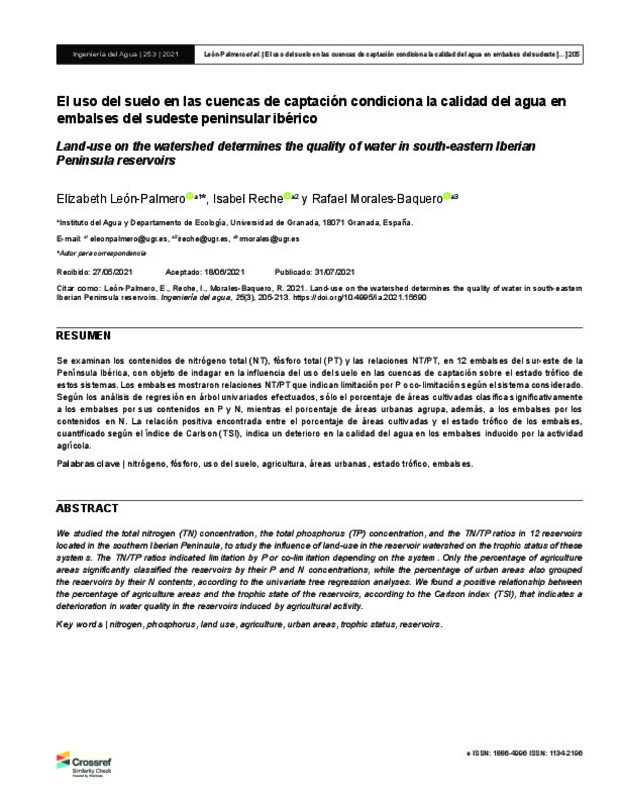Álvarez-Salgado, X.A., Miller, A.E.J. 1998. Simultaneous determination of dissolved organic carbon and total dissolved nitrogen in seawater by high temperature catalytic oxidation: conditions for precise shipboard measurements, Marine Chemistry, 62(3), 325-333. https://doi.org/10.1016/S0304-4203(98)00037-1
American Public Health Association (APHA) 1992. Standard methods for the examination of water and wastewater Washington, DC, USA: American Public Health Association. 18th edn. Edited by A.E. Greenberg, L.S. Clesceri, y A.D. Eaton.
Carlson, R.E. 1977. A trophic state index for lakes. Limnology and Oceanography, 22, 361-369. https://doi.org/10.4319/lo.1977.22.2.0361
[+]
Álvarez-Salgado, X.A., Miller, A.E.J. 1998. Simultaneous determination of dissolved organic carbon and total dissolved nitrogen in seawater by high temperature catalytic oxidation: conditions for precise shipboard measurements, Marine Chemistry, 62(3), 325-333. https://doi.org/10.1016/S0304-4203(98)00037-1
American Public Health Association (APHA) 1992. Standard methods for the examination of water and wastewater Washington, DC, USA: American Public Health Association. 18th edn. Edited by A.E. Greenberg, L.S. Clesceri, y A.D. Eaton.
Carlson, R.E. 1977. A trophic state index for lakes. Limnology and Oceanography, 22, 361-369. https://doi.org/10.4319/lo.1977.22.2.0361
Crawley, M.J. 2002. Statistical computing. An introduction to data analysis using S-Plus. Wiley, Chichester.
Downing, J.A., McCauley, E. 1992. The nitrogen:phosphorus relationship in lakes. Limnology and Oceanography, 37(5), 936-945. https://doi.org/10.4319/lo.1992.37.5.0936
Hayes, N.M., Deemer, B.R., Corman, J.R., Razavi, N.R., Strock, K.E. 2017. Key differences between lakes and reservoirs modify climate signals: A case for a new conceptual model. Limnology and Oceanography Letter, 2(2), 47-62. https://doi.org/10.1002/lol2.10036
Guildford, S.J., Hecky, R.E. 2000. Total nitrogen, total phosphorus, and nutrient limitation in lakes and oceans: Is there a common relationship? Limnology and Oceanography, 45(6), 1213-1223. https://doi.org/10.4319/lo.2000.45.6.1213
Knoll, L.B., Hagenbuch, E.J., Stevens, M.H., Vanni, M.J., Renwick, W.H., Denlinger, J.C., Hale, R.S., Gonzalez, M.J. 2015. Predicting eutrophication status in reservoirs at large spatial scales using landscape and morphometric variables. Inland Waters, 5, 203-214. https://doi.org/10.5268/IW-5.3.812
León-Palmero, E., Reche, I., Morales-Baquero, R. 2019. Atenuación de luz en embalses del sur-este de la Península Ibérica. Ingeniería del Agua, 23(1), 65-75. https://doi.org/10.4995/Ia.2019.10655
León-Palmero, E., Morales-Baquero, R., Reche, I. 2020. Greenhouse gas fluxes from reservoirs determined by watershed lithology, morphometry, and anthropogenic pressure. Environmental Research Letters, 15(4), 044012. https://doi.org/10.1088/1748-9326/ab7467
Prats-Rodríguez, J., Morales-Baquero, R., Dolz-Ripollés, J., Armengol-Bachero, J. 2014. Aportaciones de la limnología a la gestión de embalses. Ingeniería del Agua, 18(1), 83-97. https://doi.org/10.4995/ia.2014.3145
R Core Team. 2019. R: A Language and Environment for Statistical Computing Vienna, Austria: R Foundation for Statistical Computing. Available at: https://www.R-project.org/.
Rockström, J., W. Steffen, K. Noone, Å. Persson, F.S. Chapin, III, E. Lambin, T.M. Lenton, M. Scheffer, C. Folke, H. Schellnhuber, B. Nykvist, C.A. De Wit, T. Hughes, S. van der Leeuw, H. Rodhe, S. Sörlin, P.K. Snyder, R. Costanza, U. Svedin, M. Falkenmark, L. Karlberg, R.W. Corell, V.J. Fabry, J. Hansen, B. Walker, D. Liverman, K. Richardson, P. Crutzen, and J. Foley. 2009. Planetary boundaries: exploring the safe operating space for humanity. Ecology and Society, 14(2), 32. https://doi.org/10.5751/ES-03180-140232
Smith, VH., Schindler D.W. 2009. Eutrophication science: where do we go from there? Trends in Ecology and Evolution, 24, 201-207. https://doi.org/10.1016/j.tree.2008.11.009
Thornton, K.W., Kimmel B.L., Payne F.E. (eds.) 1990. Reservoir limnology: Ecological perspectives. John Wiley& Sons.
Tong, S.T.Y., Chen, W. 2002. Modeling the relationship between land use and surface water quality. Journal of Environmental Management, 66, 377-393. https://doi.org/10.1006/jema.2002.0593
Vollenweider, R.A. 1989. Eutrophication. In: Global Freshwater Quality-A First Assessment. (Meybeck, M., D. Chapman, and R. Helmer eds). World Health Organization and the United Nations Environmental Programme, 107-120.
[-]









